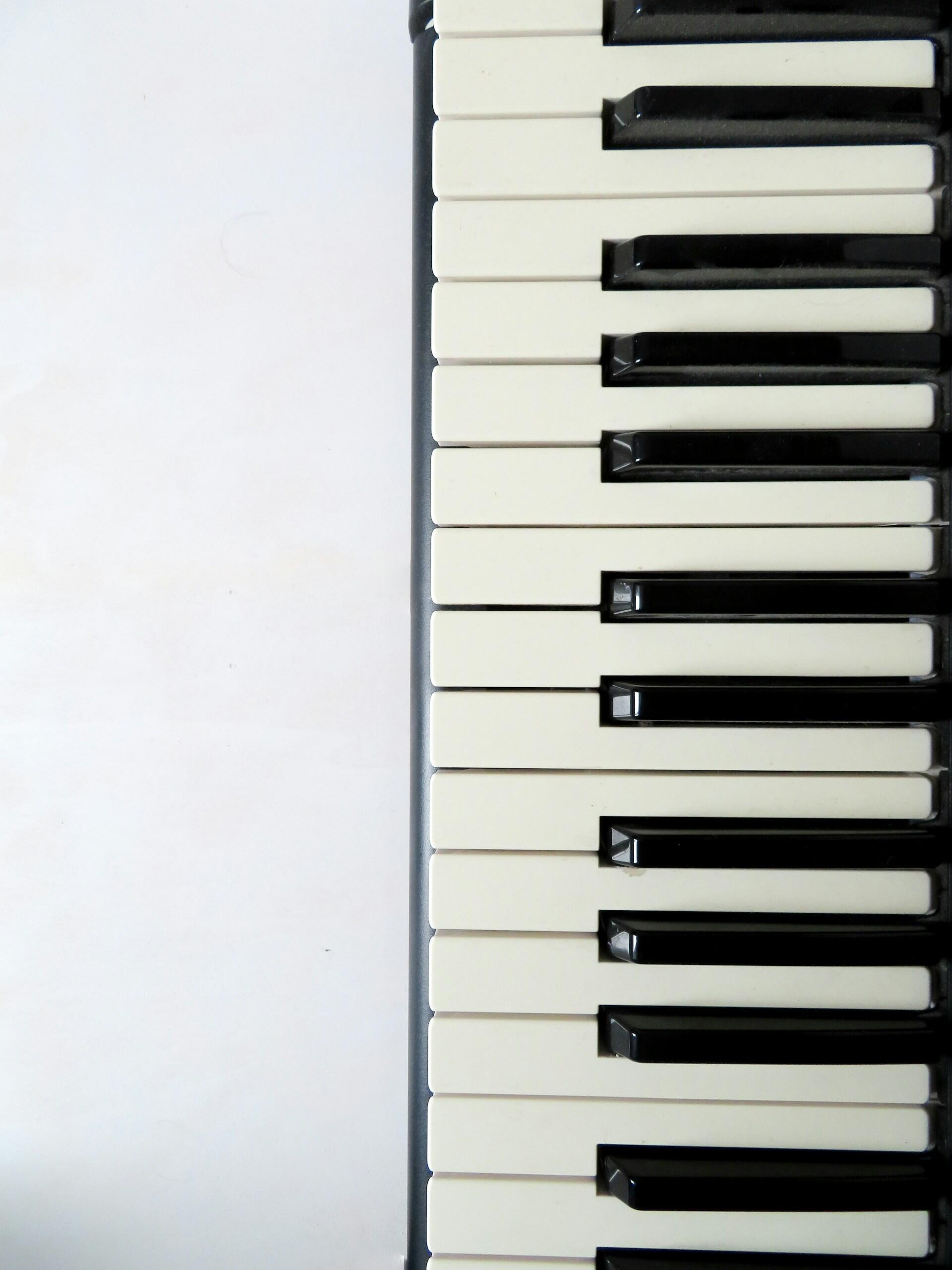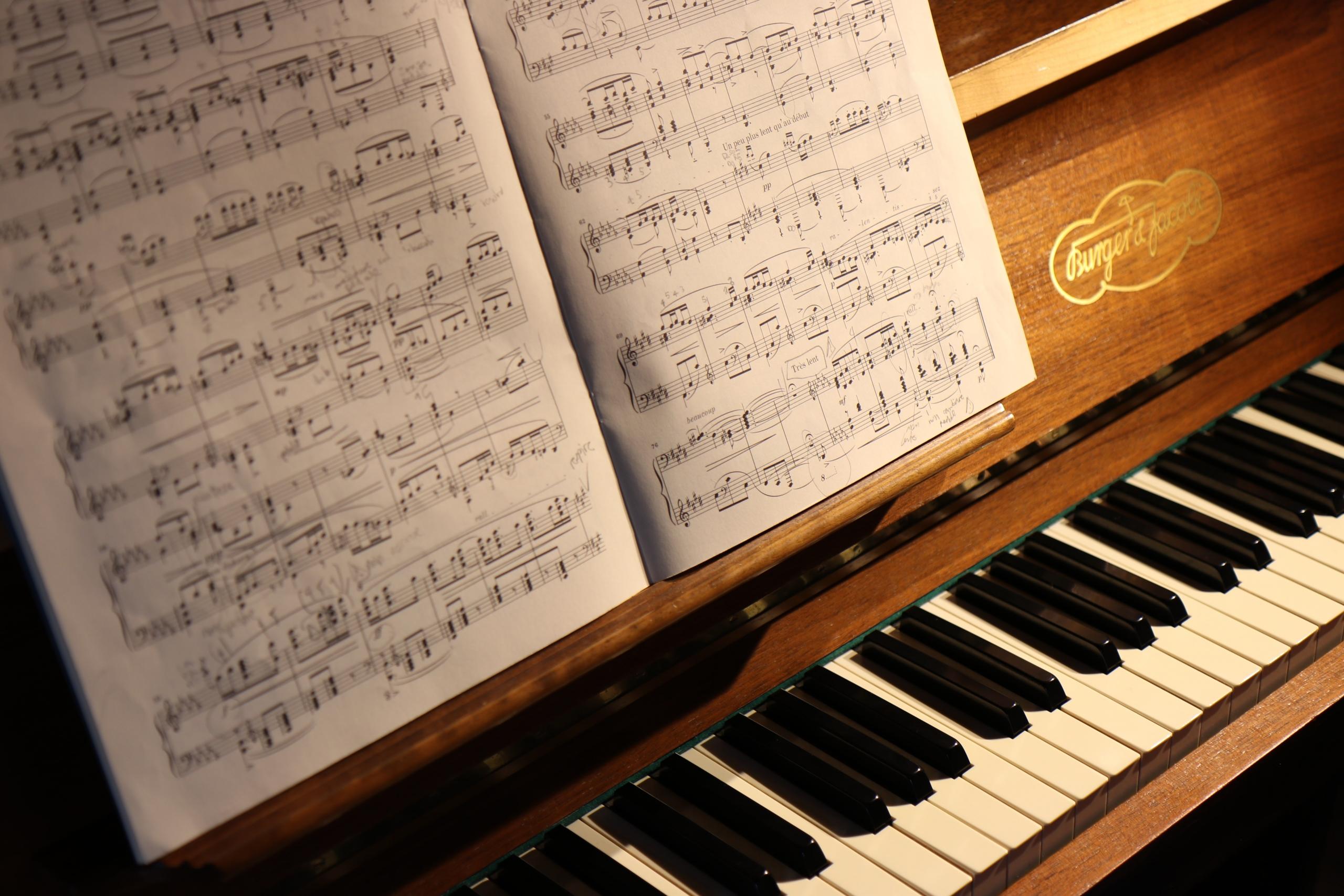The piano keys are black and white, but they sound like a million colours in your mind.
Maria Cristina Mena
In the UK, most piano students will follow the grading system offered by ABRSM, Trinity College London, or the London College of Music. Exams are structured from Grade 1 (beginner) to Grade 8 (advanced) and assess performance, technique, and musicianship. This comprehensive guide to piano grades UK explains how ABRSM structures its exams. You can also find piano lessons in Leeds on Superprof.
| Grade Level | Typical Skill Stage | Offered By |
|---|---|---|
| Grade 1 | Beginner | ABRSM, Trinity, LCM |
| Grade 2–3 | Early Intermediate | ABRSM, Trinity, LCM |
| Grade 4–5 | Intermediate | ABRSM, Trinity, LCM |
| Grade 6–7 | Advanced | ABRSM, Trinity, LCM |
| Grade 8 | Pre-Conservatoire Level | ABRSM, Trinity, LCM |

Overview of Piano Grading Systems
Piano grades are simply a structured system to assess pianists. They're tested on technical ability, musical understanding, and performance skills. In the UK, there are eight piano grades.¹ Grade 1 is the lowest and Grade 8 is the most advanced. These grades and exams are generally offered by ABRSM, Trinity College London, and London College of Music.
The ABRSM Grading System
While all musical instruments produce beautiful sounds, there is one that resonates with so many people across various continents. Which one is that? The piano. The universal acclaim of the keyboard cannot be refuted, as it is the most-played musical instrument in the world, with over 21 million people currently playing it. Therefore, without any further delay, we shall analyse piano grades across the United Kingdom and how they are structured within the ABRSM.
Piano grades are structured assessments that measure a student's performance skills, musical understanding, and technical ability at eight graded levels.
Find more piano lessons Cardiff here on Superprof.

Associations are both subtle and powerful.
Jim Rohn
An organisation in the UK that deserves a lot of attention for the great things they do is the ABRSM. What does ABRSM stand for?
The ABRSM stands for Associated Board of the Royal Schools of Music. It is an examination board and registered charity based in London which provides music exams at further education centres all around the world.
The 'Associated Board of the Royal Schools of Music' was initially established in the late 19th century and was rebranded as ABRSM in 2009. What does the 'Royal' in ABRSM mean? They are Royal schools that have been approved and include the following prestigious higher education locations:
| Institution | Location | Role |
|---|---|---|
| The Royal Academy of Music | London | Higher education institution specializing in music education and performance |
| The Royal College of Music | London | Conservatoire offering undergraduate and postgraduate degrees in music |
| The Royal Conservatoire of Scotland | Glasgow | Scotland's national conservatoire offering courses in music, drama, dance, production and screen. |
| The Royal Northern College of Music | Manchester | Leading conservatoire in the UK offering undergraduate and postgraduate courses in music performance and composition |
Music education is essential, no discussion. Therefore, the ABRSM charity must continue to exist to educate thousands of students the importance of the arts. Based on recent statistics, there are more than 600,000 candidates that take ABRSM exams in 93 countries each year; that's a lot of people!¹

Not only does the ABRSM provide personalised music education, but it also has a publishing house that regularly produces books, sheet music, and examination forms.
ABRSM plays a key role in the piano grading UK framework, setting widely recognised standards for music education across the country. For local options, Superprof lists piano lessons in Hull.
In our opinion, the essential part of the ABRSM is the exams that provide a structured framework that determines whether a person is a beginner or advanced musician.
Based on the expertise of the National Qualifications Framework¹⁰, the grades and levels can be defined as follows:
| Grade Range | Level | Description |
|---|---|---|
| Grades 1-3 | Level 1 | Introductory level focusing on foundational skills such as basic techniques, simple repertoire, and fundamental music theory |
| Grades 4-5 | Level 2 | Intermediate level requiring more advanced techniques, broader repertoire, and deeper understanding of music theory and interpretation |
| Grades 6-8 | Level 3 | Advanced level emphasizing mastery of complex techniques, extensive repertoire, advanced music theory, and high-level musical interpretation and expression |
It is essential to state that all music subjects are offered from Grades 1-8 and have three different standards of pass: a straight pass, a pass with merit, and a pass with distinction. Therefore, this means that whether students are completing practical exams, music theory exams, practical musicianship, or jazz exams, they must go through eight grades of ABRSM assessments to determine their level of talent.
In the ABRSM piano grading system, there are eight grades. These grades progressively assess a pianist's technical skills, musical interpretation, sight-reading abilities, and aural awareness.
Each grade represents a milestone in the development of a pianist, starting from foundational skills at Grade 1 to advanced proficiency at Grade 8.
Therefore, does that mean that there are eight grades of piano exams in the UK? The short answer is yes. Please read the following subheading to find out more about what is included in each class of assessments of piano playing. Find different piano lessons on Superprof.
Sometimes music is the only medicine the heart and soul need.
Do you have a passion for music? Do melodies play inside your head from the moment you wake up in the morning? Do you want to become a famous pianist?

If you answered yes to all three of the previously posed questions, completing the eight grades of the piano classes with the ABRSM is the perfect fit! The UK piano grades system is widely used by music teachers, schools, and exam boards to ensure consistent progress and standards.
Nevertheless, for those unfamiliar with the ABRSM curriculum, this section provides the piano grade levels explained in detail, from beginner to advanced. Have no fear, Superprof is here to save the day and provide the necessary information to all interested parties. Here's an overview of the components for each grade of the ABRSM piano:
| Grade | Level Description | Requirements | Repertoire |
|---|---|---|---|
| Grade 1 | Beginner | - 3 pieces (1 from each list A, B, C); scales & arpeggios; Sight-reading; Aural tests | Simple classical pieces, folk tunes, beginner-level technical work |
| Grade 2 | Elementary | Same as Grade 1 with slightly expanded difficulty and expectations | Slightly more complex rhythms and hands coordination |
| Grade 3 | Lower Intermediate | As above, with broader key range and greater technical demands | Early classical sonatinas, expressive romantic pieces |
| Grade 4 | Intermediate | Increased scale/arpeggio complexity, more advanced aural tests | More stylistic variation, deeper musical expression |
| Grade 5 | Upper Intermediate | As above + Grade 5 Theory (required to progress to Grade 6 practical) | Longer pieces, greater dynamic and technical range |
| Grade 6 | Early Advanced | - 3 pieces; More demanding technical exercises; Advanced sight-reading and aural | Advanced repertoire from classical, romantic, and 20th-century composers |
| Grade 7 | Advanced | As above, with significant demands on interpretation and technique | Virtuosic works and complex stylistic contrast |
| Grade 8 | Pre-Conservatoire / Professional Prep | Highest level exam: Performance skills; Advanced technique; Full expressive and stylistic command | Mature works by major composers, high-level interpretation and stamina |
It is essential to mention that in all eight grades (1-8), the exam structure, marking, and the general curriculum are quite similar. For example, Practical Piano Grades 1-8 consists of reviewing three pieces, scales and broken chords, sight-reading, and aural tests.¹
Also, the marking system is quite straightforward :
| Result | Score Range (out of 150) | Comment |
|---|---|---|
| Pass | 100 – 119 | Solid performance with competent understanding |
| Merit | 120 – 129 | Above average, showing good musicality and control |
| Distinction | 130 – 150 | Excellent performance with strong musical insight |
Therefore, without further ado, let us analyse the differences encountered in each Piano Grade and what students need to do to level up and acquire the ABRSM qualifications in Practical Piano Assessments.
Is it possible to skip piano grades? Learn more here!
Other Prominent Grading Systems
ABRSM is undoubtedly the most widely used exam board, but there are also Trinity College London and London College of Music that offer Grades 1 to 8 in Piano.⁴

ABRSM
- Most widely recognised in the UK
- Offers Practical & Performance Grades
- Includes aural, sight-reading & scales
- Grade 5 Theory needed for Grades 6–8 (Practical only)
- UCAS points available (Grades 6–8)
Trinity College London
- Known for flexible, expressive playing
- Practical & Digital Grades (tech work optional)⁶
- Aural not required in digital exams
- No theory prerequisite to advance
- UCAS points available (Grades 6–8)
London College of Music
- Broad repertoire: classical & modern
- Offers Practical, Performance & Leisure Play
- Leisure Play skips technical work & theory⁷
- Flexible theory requirements
- UCAS points available (Grades 6–8)
Detailed Breakdown of Each Grade
Since the grades are progressive stages, you can see how a student's technical development, musical understanding, and performance confidence improve at each level. With each building on the previous, it's worthwhile understanding what's expected at each. Here, we've broken them down into their grades while also classifying them as beginner, intermediate, and advanced levels.
Grades 1–3: Beginner Level
Starting from the beginning is essential, and the information learnt in Piano Grade 1 from the ABRSM will set learners off on the path to success. The three pieces must be learnt and can be chosen by candidates within sections A, B, and C. Some of the options include Melodie by Schumann, A Toy by Anon, and Jazzy Dragon by Barbara Snow. Also, candidates must master scales such as C major, G major, and A minor, to name a few.
Skills and knowledge expected:
- Secure basic rhythm and coordination
- Simple hands-together playing in easy textures
- Clear articulation and basic dynamic contrast
Typical pieces and technical requirements:
- Short beginner pieces with simple melodic lines
- C major scale hands together (1 octave)
- G and F major scales, A and D minor scales hands separately
- Simple contrary-motion scale and basic arpeggio
- Introductory sight-reading and aural tests
After passing Piano Grade 1, students can undergo Piano Grade 2 lessons. Many students also complement their studies by taking online piano lessons, which provide flexible learning and practical guidance.
Some of the pieces that can be worked on during Piano Grade 2 include Rondino by Haydn, Waltz in A Minor by Spindler, and Inter-City Stomp by Christopher Norton, to name a few. It is worth mentioning that one of the three required pieces can be performed as a duet with another candidate; partnership is excellent!
Another essential aspect of Piano Grade 2 is the ever-important section of aural tests that allow participants to access their sound, harmony, and balance with others. The Aural assessments help students to hone their memory skills and listen for mistakes in music.
Skills and knowledge expected:
- Improved coordination between hands
- Greater rhythmic control and accuracy
- Clearer phrasing and dynamic shaping
- Typical pieces and technical requirements:
- Slightly longer pieces with stylistic contrast
- Major and minor scales hands together (2 octaves)
- Additional keys introduced hands separately
- Simple chromatic scale
- Broken chords, sight-reading, and aural tests
Also, it is worthy of mentioning that the ABRSM has an application called "Aural Trainer" that challenges you to develop your aural skills and become a sensation. After Piano Grade 2 has been aced, pupils acquire more knowledge about scales and arpeggios in Piano Grade 3.
As the grades get higher, the precision of scales and performance increase. For example, in the Piano Grade 3 exams, students are expected to work on scales in similar motion, such as D and A majors, and contrary motion scales, such as the E Major.
Also, arpeggios such as E and G minors with hands working together and B and C minors with hands working by themselves are evaluated. The "Piano Scales Trainer" is an excellent help during Piano Grade 3 since it helps increase fluency of the distinct scales and arpeggios required.
Skills and knowledge expected:
- Increased finger independence and control
- Better balance between melody and accompaniment
- Growing confidence in reading notation
Typical pieces and technical requirements:
- Pieces with varied articulation and phrasing
- Major and minor scales hands together (2 octaves)
- Contrary-motion scales in selected keys
- Chromatic scales and arpeggios
- More demanding sight-reading and aural tasks
Grades 4–5: Intermediate Level
In Piano Grade 4, another three pieces are required and can be chosen from sections A, B, or C. For instance, candidates learning piano may acquire the notes of Schubert, Beethoven, and Bartok.
It is important to remember that the marking criteria are completed in a non-traditional way by analysing non-instrument-specific criteria and by focusing on the musical outcome. To understand more about the ABRSM marking system, click this link.
Skills and knowledge expected:
- Clearer musical shaping and stylistic awareness
- Improved coordination in more complex textures
- Stronger rhythmic stability
Typical pieces and technical requirements:
- Longer pieces from different musical periods
- Expanded range of major and minor scales hands together
- Additional keys introduced hands separately
- Chromatic scales hands together
- Arpeggios, sight-reading, and aural tests with greater detail

Piano Grade 5 consists of mastering similar aspects of previous levels but at a more advanced stage. For example, the following topics are required to undergo when analysing Piano Grade 5:
- Three pieces,
- Scales and arpeggios,
- Aural tests,
- Sight-reading.
We highly recommend downloading the ABRSM "Theory Works" app to make music theory more engaging during piano grades 1-5.
Skills and knowledge expected:
- Confident tone control and articulation
- Greater expressive awareness
- Increased technical reliability
Typical pieces and technical requirements:
- More demanding repertoire with musical contrast
- Major and minor scales across a wide range of keys
- Scales hands together and hands separately
- Contrary-motion and chromatic scales
- Expanded arpeggio patterns
- Sight-reading and aural tests requiring quicker response
Grades 6–8: Advanced Level
Now we've hit the big leagues! Piano Grades 6, 7, and 8 are considered advanced levels and require specific training beforehand to be eligible to undergo these lessons. For instance, the prerequisite to enter Piano Grade 6 is to have had completed Musical Theory, Practical Musicianship or Jazz Instrument. If you're looking for local tuition, find piano lessons in Liverpool.
If you have studied the previously mentioned options, you are eligible to keep exploring the ABRSM Piano programme and learn more advanced pieces of music and aural tests. It is worth mentioning that aural music exams are explicitly focused on in Grade 6. Consider downloading the "Piano Practice Partner" app to aid the learning process.
Skills and knowledge expected:
- Advanced technical control and coordination
- Confident interpretation of contrasting styles
- Greater consistency under performance conditions
Typical pieces and technical requirements:
- Complex works from different musical periods
- Major and minor scales over three octaves hands together
- Additional scales hands separately
- Chromatic scales over extended range
- Arpeggios, dominant sevenths, and diminished sevenths
- Challenging sight-reading and refined aural tests
Grades 6, 7, and 8 (with ABRSM, Trinity, or LCM) earn UCAS tariff points.³ A distinction in Grade 8 can earn you as many as 30 points, which is more than an AS-level!⁹
In Practical Piano Grade 7, the secret recipe for success focuses on mastering aural tests, playing three composed pieces of music beautifully on the piano, and learning multiple scales.
Examples of some of the three pieces that can be selected include Sinfonia No. 15 in B Minor by Bach, Pink Minor by Dring, and Bamboo Dance II by Chen Yi.
At this level, piano examiners expect fine-tuning and near perfection before letting you move on to the last Piano Grade. Find more piano lessons for adults here on Superprof.
Skills and knowledge expected:
- High level of musical maturity and expression
- Strong stylistic understanding
- Near-performance-ready accuracy
Typical pieces and technical requirements:
- Demanding, extended repertoire with interpretative depth
- Scales over four octaves in selected keys
- Scales in thirds and sixths
- Chromatic and whole-tone scales
- Advanced arpeggios and chord patterns
- High-level sight-reading and detailed aural accuracy
The last of the last, the summit, the grand final, what am I talking about? Piano Grade 8. It is essential to mention that the exams from the ABRSM are no piece of cake; that is why you gradually work your way up to this level.
Achieving Grade 8 in piano is considered a challenging goal that requires a significant level of dedication, practice, and musical proficiency. Grade 8 represents an advanced level of piano playing where candidates are expected to demonstrate mastery of technical skills, interpretation of complex musical pieces, advanced sight-reading abilities, and aural skills.
Candidates preparing for Grade 8 exams typically need to perform three contrasting pieces from different musical periods, including Baroque, Classical, Romantic, or contemporary repertoire. They are also required to demonstrate proficiency in scales, arpeggios, sight-reading, and aural tests.
In Piano Grade 8, a lot of emphasis is given to mastering the scales, broken chords, and arpeggios. Check out the 2023-2026 curriculum of Piano Grade 8 to learn more about what is expected of you.
All in all, it is essential to remember that if you aced or passed the last seven grades of learning, you must be doing something right, and you should try to apply it at Piano Grade 8.
Skills and knowledge expected:
- Mastery-level technical and musical control
- Confident, expressive performance under exam conditions
- Sophisticated interpretation across styles
Typical pieces and technical requirements:
- Challenging, contrasting works from multiple musical eras
- Four-octave scales in selected keys, legato or staccato
- Scales in thirds and sixths
- Chromatic and whole-tone scales
- Advanced arpeggios, dominant sevenths, and diminished sevenths
- Very high expectations for sight-reading and aural precision

ABRSM Performance Grades
Since 2020, ABRSM has also offered Performance Grades, which are a fully digital exam format covering Grades 1-8.²
Practical Grades
- In-person exam
- 3 pieces and scales, sight-reading and aural tests
- Available Grades 1–8
Performance Grades
- Video submission
- 4 pieces only (no technical work)
- Available Grades 1–8
According to many past amateur pianists studying with the ABRSM, skipping a couple of practical Grades before Grade 6 is entirely possible and commonplace. Since all Practical Piano Grades (1-8) have the same structure, skipping through some levels is possible because music pieces, scales, and arpeggios are analysed, with the only difference being the level of skill from grade to grade.
For ABRSM Piano exams, Grades 1-4 can be skipped without any issues; however, the Grade 5 theory exam must be completed since it is a prerequisite for practical grades 6, 7, and 8.¹
Preparing for Piano Grade Exams
By knowing the marking system, piano players can practice useful techniques that will ensure top marks with their tutor before examination days. Since all students should aim for the highest marks, the following is a brief description of what is needed to get a distinction on a piano exam in the five categories that are tested:
Practice Strategies
Consistent, focused practice is better than long, irregular sessions. Pianists preparing for any grade exam should balance their technical work, repertoire, and musical interpretation as they build confidence. Always practise with a clear goal in mind.
Common Challenges and How to Overcome Them
Students struggle more often than not because of nerves, poor practice routines, or the trickier exam components. Make sure you identify where the issues lie. From there, you can adapt your practice appropriately.
Benefits of Pursuing Piano Grades
A pianist can benefit a lot from piano grades. The framework they provide is helpful for long-term progress. Many find motivation, recognition, and a sense of achievement in doing piano grades. Those in Leicester can search Superprof for piano lessons.
Structured Learning Path
The graded piano system helps students progress. Each level builds on the previous. Technical ability, musical understanding, and performance confidence will all grow together.
Recognition and Motivation
Passing a grade comes with a lot of motivation. Grades also give pianists something to aim for. It's hard to measure how good you are at any musical instrument; grading helps formalise the otherwise muddy process of learning an instrument.
We hope you thoroughly enjoyed the precise explanation of what is included in the eight piano grades offered by the ABRSM. After the long process of studying has been completed, and you want to further your fine-tuning of piano playing, the ASRM exam is highly recommended to launch a successful career.
We truly salute you because by playing the piano in front of others, you are making the world a better place; cheers! Need some tips to get prepared for piano exams? Look no further than the advice from Superprof!
References
- Associated Board of the Royal Schools of Music (ABRSM) – Practical Music Grades: Piano Syllabus 2025 & 2026
https://www.abrsm.org/sites/default/files/2024-06/Piano%202025%20%26%202026%20Prac%20syllabus%2020240524_access.pdf - Associated Board of the Royal Schools of Music (ABRSM) – Music Performance Grades: Piano 2025 & 2026
https://www.abrsm.org/sites/default/files/2024-06/17%20Performance%20Grades%20Qual%20Spec%20-%20Piano%202025%20%26%202026%2020240603_access%20%281%29.pdf - Associated Board of the Royal Schools of Music (ABRSM) – About Performance Grades
https://www.abrsm.org/en-gb/performance-grades/about-performance-grades - Associated Board of the Royal Schools of Music (ABRSM) – Regulatory bodies and UCAS points
https://www.abrsm.org/en-gb/about-our-exams/regulatory-bodies-and-ucas-points - Trinity College London – Piano
https://www.trinitycollege.com/qualifications/music/grade-exams/piano - Trinity College London – Digital Classical & Jazz Grades
https://www.trinitycollege.com/qualifications/music/grade-exams/digital - London College of Music Examinations (LCME), University of West London – Piano Syllabus (2021–2024)
https://lcme.uwl.ac.uk/media/el4fzyxr/lcm_piano_syllabus_2021-2024_v12.pdf - London College of Music Examinations (LCME), University of West London – Piano
https://lcme.uwl.ac.uk/our-exams/piano/piano/ - UCAS – Calculate your UCAS Tariff points
https://www.ucas.com/applying/before-you-apply/what-and-where-to-study/entry-requirements/calculate-your-ucas-tariff-points - UK Government (GOV.UK) – What qualification levels mean
https://www.gov.uk/what-different-qualification-levels-mean
Summarise with AI:

























Thanks! I feel better all ready, due to that my piano exam is on this friday!